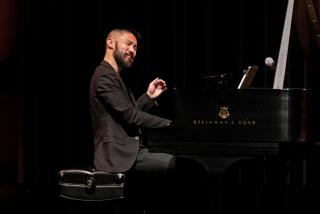Drama in B-Flat : Tchaikovsky Scandal Is Focus of Play
- Share via
For decades, Donald G. Richardson taught that Tchaikovsky died of cholera, albeit under mysterious circumstances.
Then, five years ago, the chairman of Santa Monica College’s music department came across an article, newly translated from the Russian, that revealed that the great composer had been persuaded to commit suicide after a homosexual affair.
“Tchaikovsky died at age 53 with a lot more music in him. I think it was one of the greatest tragedies in music history. And I thought it would make a marvelous play,” said Richardson, 66, who has turned the fragment of revisionist history into a drama with music.
Called “Tchaikovsky,” the new play is a collaboration with Toby Bluth, 51, a writer, director, designer and animator who was one of Richardson’s students at Santa Monica High School. It premieres Friday at Santa Monica College’s Main Stage, 1900 Pico Blvd., at 8 p.m.
“Tchaikovsky” is like “Amadeus” in that its composer hero is hounded to a premature death. But Tchaikovsky’s demise is even more shocking in some ways. In Peter Schaffer’s play, Mozart may or may not have been murdered by his rival Salieri. Tchaikovsky was supplied with poison after a kangaroo court of his former law school classmates decided that death was the only way the composer could avoid bringing scandal on himself and, perhaps more important, on them.
As Richardson pointed out, Tchaikovsky was one of the most celebrated composers in the world when he died in 1893. He had received honorary doctorates from Oxford and Cambridge, and he had traveled all the way to New York to participate in the opening of Carnegie Hall. But Russian law was very clear on the consequences of homosexual acts, which could be punished by exile, public lashing and worse. And the young man with whom Tchaikovsky was involved was the nephew of Duke Andrey Stenbock-Thurmor, who threatened to write to the czar informing him of Tchaikovsky’s shocking behavior.
“It was very Oscar Wilde,” said Bluth, alluding to the scandal at about the same time involving the British poet and a young nobleman that resulted in Wilde’s disgrace and imprisonment. “Tchaikovsky had a passion for beauty, and he lost all sense of judgment in the presence of it.”
Bluth said the young man in question “knew Tchaikovsky was a star and enjoyed basking in that.” The young man was also a bit of a ninny, at least in the eyes of the playwrights. “Tchaikovsky takes him to concerts--he sits in the box reserved for Tchaikovsky--and the kid can’t even remember what he heard,” said Bluth, lapsing into the authorial present tense.
Richardson and Bluth co-authored half a dozen earlier plays, mostly children’s musicals. Of their collaboration, Bluth said, “What he brings to this thing is a great deal of academia, the information that is important to understanding Tchaikovsky, and what I bring is show biz.”
The play includes a dramatization of the “trial” that condemned Tchaikovsky, and the authors make Tchaikovsky’s most spirited defender a woman, his patron Nadejda Philaretovna von Meck.
According to Bluth, despite Tchaikovsky’s sexual orientation, he “didn’t want for wives or girlfriends.” Von Meck was a enormously wealthy and powerful woman who responded in the most visceral way to Tchaikovsky’s music.
Von Meck said she would support Tchaikovsky on the condition that they never meet face to face, perhaps, Bluth speculated, because she knew her grand passion for the composer would never be satisfied physically. Bluth pointed out that Von Meck would invite Tchaikovsky to stay at her summer house. “After he would go home, she wouldn’t allow the servants to change the sheets and would sleep in his bed,” Bluth said.
According to Richardson, Tchaikovsky tried throughout his life to keep his homosexuality a secret. Even in his diary, he referred to it in code, using the letters x, y and z. Faced with public exposure, possible exile and the prospect of his music being vilified or banned, he chose to die. His willingness to sacrifice his life for his art makes him a hero, not a victim, in the authors’ view.
The playwrights think the play has special appeal now, given the interest in all things Russian. They also think it is relevant in its portrayal of the tragic consequences of homophobia. But, most of all, they think it is a compelling story, with music by a wonderful composer--Tchaikovsky.
In order to mask his suicide by poison, Tchaikovsky ostentatiously drank a glass of unboiled water in a St. Petersburg restaurant during a cholera epidemic. The authors speculate that drinking the potentially tainted water was a ploy to ensure that he would be buried in the Russian Orthodox Church, which denies church funerals to suicides. Three agonizing days later, Tchaikovsky was dead.
There is a terrible footnote to Tchaikovsky’s death.
It was probably unnecessary, according to Richardson.
“Czar Alexander said later that if he had received that (the duke’s) letter, he would have ignored it.”
Performances are Friday and Dec. 13 at 8 p.m., Saturday and Dec. 14 at 2:30 p.m. and 8 p.m., and Sunday and Dec. 15 at 2:30 p.m. Tickets are $6.50. For further information, call (310) 452-9214.
More to Read
The biggest entertainment stories
Get our big stories about Hollywood, film, television, music, arts, culture and more right in your inbox as soon as they publish.
You may occasionally receive promotional content from the Los Angeles Times.










